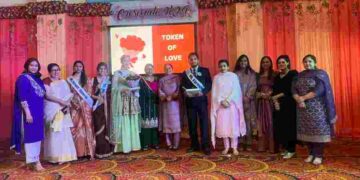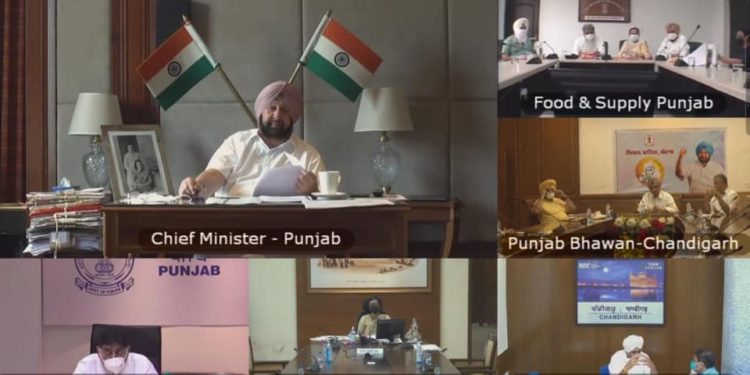CM STRESSES ON MEETING TARGET OF 100% PIPED WATER BY 2022 & TOTAL OPEN DEFECATION FREE IN 5 YEARS
Chandigarh, September 17: To ensure universal coverage of rural households with piped water connections, the Punjab government has decided to accord first priority to providing Functional House Tap Connections (FHTCs) in the remaining 17.59 lac households from the tied grants for water under 15th Finance Commission to meet its 2022 target of 100% piped water connectivity.
Of the 17.59 lac households that still remain to be connected, 7.60 lacs with FHTCs would be covered in 2020-21 and 9.99 lac in 2021-22, as per the decision taken on Thursday at a virtual Cabinet meeting chaired by Chief Minister Captain Amarinder Singh.
The Cabinet also decided to give top priority to Swachh Bharat Mission (Gramin) SBM(G) Phase II, for making all villages in the state ODF-plus in the next 5 years, from allocations available under tied grants for sanitation under the 15th Finance Commission. An ODF Plus village is defined as a village which sustains its Open Defecation Free (ODF) status, ensures solid and liquid waste management, and is visually clean.
The Chief Minister stressed the need to meet both the targets, on water and sanitation, to ensure that the people of the state get the basic living standards they deserve.
A spokesperson of the Chief Minister’s Office said after the Cabinet meeting that the Department of Rural Development & Panchayats has been instructed to issue the necessary directions to Gram Panchayats for utilization of the specified funds for water and sanitation related activities. To ensure transparency and proper usage of 15th Finance Commission grants, the allocations are to be transferred to Gram Panchayats in three different bank accounts i.e. for un-tied grants and for tied grants water & sanitation component separately.
The Punjab Government has already allocated grants to all the villages under 15th Finance Commission under which funds are tied up to 25% each for water and sanitation related activities. For the water project, the State would contribute nearly Rs. 1000 Cr. in FY 21 and FY 22 as its share, including funds to be used from convergence with Finance Commission grants. Projects worth Rs. 2000 Cr. would be completed to augment rural water supply schemes in a big way.
The Cabinet further decided that any shortfall in availability of funds for achieving the government’s water and sanitation targets would be met from funds available with Gram Panchayats/Block Samitis/Zila Parishad from other sources, so that the state can achieve the target of 100% households with functional household tap connections by March 2022 and make all villages ODF-plus in the next 5 years.
The Cabinet also gave the go-ahead to the Rural Development & Panchayats Department to issue guidelines to Panchayati Raj Institutions for utilization of ‘tied grants for sanitation’ under the 15th Finance Commission for various sanitation activities in the villages. These activities include retrofitting of toilets at community level for group of toilets, construction of community compost pits, soak pits/grey water management system, waste water quality sampling and testing, collection and transportation of solid waste using Tri-cycles/other vehicles from households to village level treatment site and management of compost centre, wages for collection and segregation of waste.
It may be recalled that the Punjab Cabinet had earlier, in its May 24, 2020 meeting, approved utilization of tied grants for water under 15th Finance Commission, available with PRIs for dovetailing with Jal Jeevan Mission (JJM) funds in order to achieve the target of 100% households with piped water connections.
The Jal Jeevan Mission was launched by GoI to achieve 100% rural household connections by 2024. However, the Punjab Government is committed to achieving the target of universal coverage of 100% rural households with FHTCs at an accelerated pace in the next two years i.e. by the end of March, 2022.
The State Department of Water Supply & Sanitation (DWSS) has already provided piped water supply in 11399 villages (94.75%) and 50% households are covered with Functional Household Tap Connections (FHTCs). DWSS has planned various initiatives to cover 17.50 lakh left over households in coming two years. Voluntary Disclosure Scheme (VDS) was launched from 15th June, 2020 for regularizing the existing unapproved connections free of cost. Besides this, an extensive household survey would be undertaken shortly. Remaining uncovered households would be given piped water supply through Panchayats.
Under the Swachh Bharat Mission (Gramin) Phase-II, the Centre has targeted further enhancement of the sanitation and hygiene status in rural India through community participation. The mission envisages to ensure sustainability of Open Defecation Free (ODF) status of villages and to provide adequate Solid and Liquid Waste management facilities in the villages. The scheme focuses on convergence of funds received under 15th Finance Commission grants by Panchayat(s) as well as MGNREGA and other funds. SBM(G) Phase II includes components like construction of Individual Household Latrines of left-out beneficiaries, providing community sanitary complexes, Solid Waste Management including Composting, GOBAR-dhan (Bio Gas Plants), Plastic Waste Management, Liquid waste management and grey water management, Faecal sludge management & continued Information, Education and Communication (IEC) activities for behavioural change.








